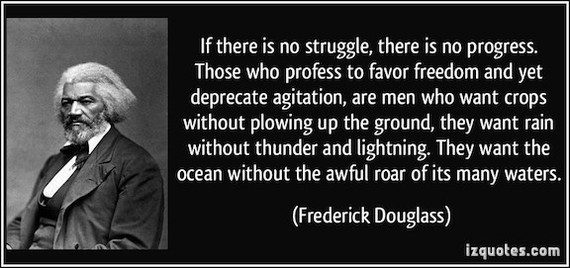In an 1857 speech, Fredrick Douglass offered this advice: Let me give you a word of the philosophy of reform. The whole history of the progress of human liberty shows that all concessions yet made to her august claims have been born of earnest struggle. [...] If there is no struggle there is no progress. Those who profess to favor freedom and yet deprecate agitation are men who want crops without plowing up the ground; they want rain without thunder and lightning. They want the ocean without the awful roar of its many waters.
Douglass called for a struggle for a democracy in which the disempowered are the active agents and shapers of their own destiny.
Donald Trump and promoters of unelected school boards would have us acquiesce to a contrary subservient vision. How dare I equate Trump's racist, xenophobic, misogynistic, authoritarian appeal with charter-school advocates who wrap themselves in the mantle of civil rights? Well, I am not equating, but I am asserting that they share a dangerous dismissal of the vitalness of democracy.
Trump wears his disdain for democracy proudly on his sleeve. I am your voice... No one knows the system better than me, which is why I alone can fix it. Trump's message is that the solution to persistent problems is not democracy or for people to join with one another in a struggle for a better life, but rather to trust him.
Advocates for privately governed, but publicly funded, charter schools are more circumspect. To justify abandonment of democracy, they point to the dysfunction of elected school boards. Netflix's billionaire CEO Reed Hastings, a charter school cheerleader, argued that instability due to turnover in elected school boards makes long-term planning difficult. Similarly, in one post the Fordham Foundation asserted, "When it comes to school boards, what matters most is the character of those who serve -- not how they were selected." Whatever it takes to get the job done assertions have a practical and utilitarian patina, but are profoundly anti-democratic as its apostles typically eschew the inconvenience of dissent and challenge. History is replete with examples of the slippery slope that begin with constrained restrictions of inconvenient democracy in the name of addressing real or trumped up threats but end with more generalized despotism. The solution to the necessary messiness of contentious democracy is never its avoidance in the name of expediency.
In contrast to Douglass's call for struggle, Trump, and advocates for privately governed charter schools share a let others solve your problems for you philosophy. Many share something else. They are- or claim to be- billionaires. The already empowered stake their claims to legitimacy on convincing "the less fortunate" that despite vast differences in wealth, power, and life circumstances, they should trust the judgment of their self-appointed defenders rather than one another. One such disingenuous pitch is that poor folks should have the same school choices as the wealthy. The cynical messages are: Give up on struggle for equity across your racial differences. Give up on democratically governed schools. Improvement depends on being out for yourself, just like us.
"If you don't like the product, take your business elsewhere," may suffice for individual choices like buying cars or a burger, but it is a terribly dangerous way to govern the broad public good of educating all of our children.
Individual choice within an inequitable system is no substitute for democratically directed improvement for all.
The rub of the selfish approach is that it has never worked well except for a very few exceptional class escapees while leaving the privileged still in power and still privileged. Douglass was not only historically accurate about victories for liberty. He was also prescient about the next century. All of the benchmarks of 20th-Century progress for social, economic, civic, and racial justice and human rights were achieved through common struggle. Placing faith in, "Just trust me. I know what's good for you," exhortations, whether they come from a presidential candidate, elected office holder or charter school board is a perilous abdication and very risky bet. Expertise-when it is real- is valuable, but it only works when it is democratically authorized, monitored and controlled on behalf of equity-driven values.
Arthur H. Camins is the Director of the Center for Innovation in Engineering and Science Education at Stevens Institute of Technology. He has taught and been an administrator in New York City, Massachusetts and Louisville, Kentucky. The views expressed in this article are his alone.
His writing is collected at http://www.arthurcamins.com
He tweets at @arthurcamins

